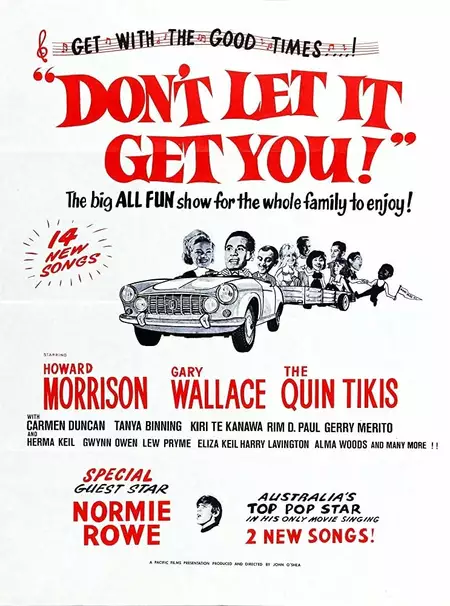Don't Let It Get You (1966)
January 29, 1966Release Date
Plot.
Where to Watch.
Cast & Crew.

Howard Morrison

Gary Wallace

Carmen Duncan

Normie Rowe

Kiri Te Kanawa

Harry Lavington

Alma Woods

Tanya Binning

Ernie Leonard

Anne Sharland

Rim D. Paul

Joe Mustapha
Writer

D. Russell Rankin
Associate Producer

John O'Shea
Producer / Editor / Director

Patrick Flynn
Music

Tony Williams
Director of Photography

Patrick Hanly
Production Design

Gwynn Owen

Herma Keil

Gerry Merito
Details.
Release DateJanuary 29, 1966
StatusReleased
Filming LocationsSydney, Australia
Genres
Last updated:
Wiki.
Don't Let It Get You is a film made in New Zealand and Sydney, Australia in 1966. It is notable for the period it was made in as well as the popular musical acts that featured in it.
Sir Howard Morrison, Eddie Low, Dame Kiri Te Kanawa and Herma and Eliza Keil of the Keil Isles featured in the film. It also had an appearance by Australian hit maker Normie Rowe.
Directed by John O'Shea and written by Joseph Musaphia, the film captures the exuberance and energy of one of New Zealand's finest hours in pop/rock musical history. Fashioned in the style of Richard Lester's A Hard Day's Night (1964) and Help! (1965), it is a showcase for the talents of the period, including Kiri te Kanawa ("Sing for us now, Kiri"). The songs are mostly written by Patrick Flynn in collaboration with either O'Shea or Musaphia. However, the film is also a knockabout romantic comedy: the dialogue non-sequiturs, pratfall gags and bizarre juxtapositions display an offbeat sense of irony and blase manner not unlike that of television in the late Eighties (Terry and the Gunrunners and The Billy T. James Show, for example). As a nostalgia piece, the film comes as close to capturing the hopes and aspirations of the period as the Weekly Reviews do for the Forties and the Tangata Whenua series does for the Seventies.

